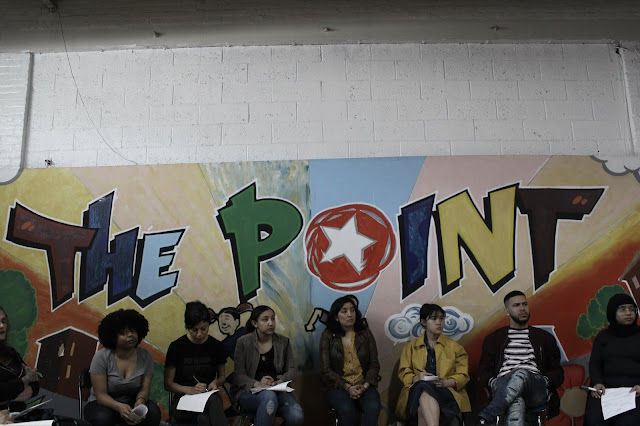Abolitionists say new jail is not needed
 |
| Residents and members of No New Jails gather at The Point on Apr. 7 for a discussion about alternatives to incarceration.
While the mayor touts his plan to build four new, modern jails across the city to create more humane conditions for detainees, one group says that the proposal does not go nearly far enough to reform the criminal justice system. Instead, the grassroots group calling itself No New Jails NYC says that while the jail on Rikers Island should indeed be closed as the city is proposing, nothing should be built to replace it.
Some 30 residents attended a heated community speak out on April 7 at The Point, to discuss the rationale for creating a penal system that calls for alternative measures rather than incarceration. The debate has taken on added emphasis in the South Bronx because of the new jail Mayor de Blasio’s administration says it will build in Mott Haven.
“I live two blocks down the street where they want to build the jail and I attended a town hall meeting in my neighborhood last year,” said Myra Hernandez, a 46-year-old educator who lives in Mott Haven. “It’s been through education, meeting folks through Critical Resistance and also meeting members of No New Jails that made me realize I am an abolitionist.”
Critical Resistance, a national jail abolition group with headquarters in California, had a storefront on Longwood Avenue during the early 2000s. Their advocacy and community organizing helped shut down the city’s efforts to build a new jail on a 28-acre parcel on Oak Point Avenue.
Attendees at the Apr. 7 speak out argued that the city is at a turning point in its jail policies, and New Yorkers should push to ensure that new jails are not part of the future. Several recounted their own personal experiences, either at having had a family member who had been imprisoned or having gone through the system themselves.
“I always took the experience of being incarcerated on Rikers with me and it was very traumatic,” said Lisa Ortega, a member of the Longwood-based activist group Take Back the Bronx. “I ended up having a son who was going through the same system and I kind of started to see how it was a generational problem and that jails and prisons seem to be some kind of a right of passage to certain people, and to certain areas that looked a certain way and have a certain income.”
Mayor Bill de Blasio announced in 2018 that the city aims to decrease the jail population to about 5,000, then open four new jails of 1,471 beds in each borough. A new Bronx jail would be located next to the Bruckner in Mott Haven, on a 4.5 acre parcel at E. 141st Street. That would include closing the Vernon C. Bain Center, an 800-bed jail barge that has been moored off the East River in Hunts Point since 1992.
Activists, however, countered that new jails will provide the city cells to jail even more people than has been the case prior, and will increase racist policies by forcing the city to jail even more blacks and members of the Latinx community.
Along with Mott Haven, new jails are planned in Manhattan’s Chinatown, Kew Gardens in Queens and Downtown Brooklyn.
Bronx Borough President Ruben Diaz Jr. has sided with South Bronx residents who angrily oppose the jail plan, but has not gone as far as to say that a new jail should not be built in the Bronx. He has called for a new jail to be built next to the Bronx Criminal Courthouse on E. 161stStreet. City Councilwoman Diana Ayala, who represents the district where the jail would be built, is the only elected official representing the area who advocates for building the jail in Mott Haven, saying that residents of detainees interred in the jail could visit loved ones more easily, and local residents can pressure the city to provide more funding for social services.
The abolitionist group says it is optimistic that its argument will prevail.
“There’s a lot of people who are really dedicated and willing to do the work,” said Natalia Gibbs, a 25-year-old doula from Queens. “My hope is that with that power and with these numbers, that will be more than a reason for them to not just not build the jails, but for them to close Rikers immediately and to really continue the abolitionist movement.”
This article was originally published in The Hunts Point Express.
|


Comments